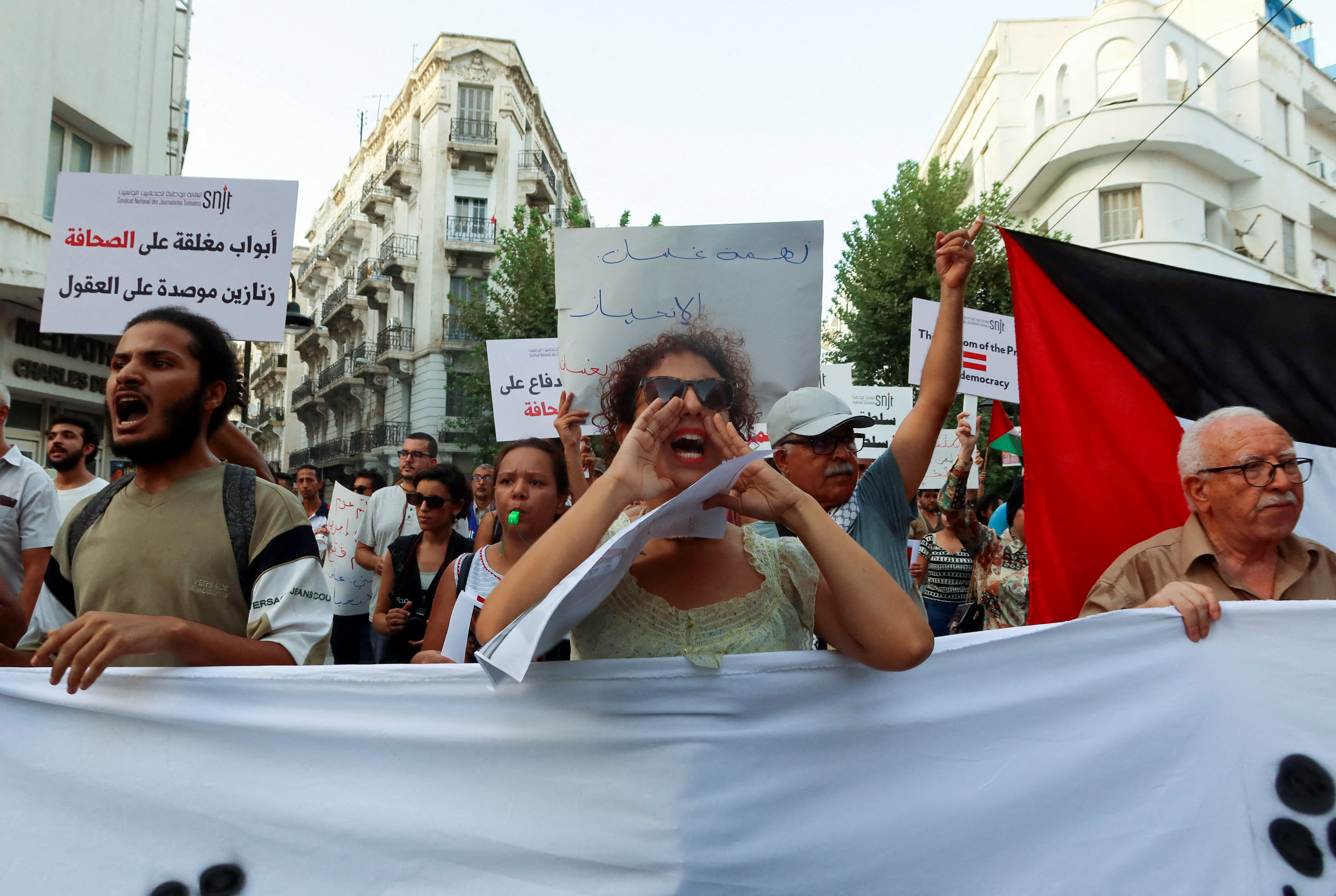
For detractors of Tunisia’s President Kais Saied, the trial of more than 40 opposition figures is quite clearly a further nail in the coffin of the country’s democracy – and the rule of law.
The defendants in the trial – which resumes on Friday after being adjourned the day it opened on March 4 – are some of the government’s leading critics. They include former diplomats, media personalities, and members of what was once parliament’s biggest party, the ‘Muslim Democrat’ Ennahda.
And yet, they face charges such as “plotting against the state” and “belonging to a terrorist group”, accusations that were denounced on the first day of the trial as an “absurdity” by defence lawyer Abdelaziz Essid.
One of those being tried – in absentia – in what has become known as the ‘conspiracy case’ is even the French intellectual, Bernard-Henri Levy, who is accused of being a conduit between defendants and foreign parties.
Information on the precise details of the trial remain cloudy, with the exact number of those on trial and the specific charges they face unclear.
The mass trial has been denounced both on the streets of Tunis, where hundreds of people took to the streets on Wednesday, and by observers and analysts who spoke to Al Jazeera and describe the court proceedings as another example of Saied’s deliberate silencing of dissent.
Flawed trial
Rights groups, including Human Rights Watch (HRW), have slammed the mass trial as evidence of a “weaponised” judiciary and a further crackdown on fundamental freedoms. In the build-up to the trial, the United Nations criticised the government, calling on it in a statement earlier this year to “end all forms of persecution of opponents and activists”.
The Tunisian Foreign Ministry subsequently criticised what it said were “inaccuracies” in the UN statement.

In February, nine of the defendants facing trial were deemed “too dangerous” to attend their trial in person.
Six of them, including leading opposition figure Jaouhar Ben Mbarek and a former Ennahdha leader, Abdelhamid Jelassi, have been held since February 2023.
Ben Mbarek began a hunger strike on March 30 to protest his exclusion from his trial.
He was joined on Wednesday by five other defendants similarly excluded from their trial – the aforementioned Jelassi, politicians Issam Chebbi, Khayam Turki and Ghazi Chaouachi, and lawyer Ridha Belhaj.
All of the defendants face lengthy jail sentences if found guilty, up to and including the death penalty, which has been suspended in Tunisia since 1991.
“President Saied has weaponised Tunisia’s judicial system to go after political opponents and dissidents, throwing people in arbitrary detention on flimsy evidence and pursuing them with abusive prosecutions,” Bassam Khawaja, deputy Middle East and North Africa director at HRW, told Al Jazeera.

Weakening the judiciary
Increased government control over the judiciary have many observers worried as to whether the defendants in the trial have a realistic chance of being found innocent, even if the evidence against them is weak.
Doubts over the independence of Tunisia’s judiciary have grown since Saied dissolved the country’s judicial council in 2022 and then replaced it with a body he has more control over.
What internal resistance remained to Saied’s changes ended in June that year, when he dismissed 57 judges, telling a television audience he had “given opportunity after opportunity and warning after warning to the judiciary to purify itself”.
“The conspiracy trial is a living example of how the office of the prosecutor and courts are used as a tool to crush dissent and to crack down on the rule of law and fundamental freedoms,” Said Benarbia of the International Commission of Jurists told Al Jazeera.
“The prolonged, arbitrary pre-trial detention, the lack of credible evidence, and the order prohibiting some of the defendants from attending their own trial in person, leave no doubt as to the unfairness and the politicised nature of the conspiracy trial,” he said.
No longer a success story
Tunisia had been celebrated as one of the few successes of the 2011 “Arab Spring” revolutions, with strong political engagement among its public and civil society members, who frequently took to the airwaves and streets to make their voices heard.
The years that followed the revolution, which overthrew long-time autocrat Zine El Abidine Ben Ali, saw the growth of a healthy political system with numerous elections declared free and fair by international observers.
But a weak economy and the strengthening of anti-democratic forces led to a pushback, capped off by Saied’s dismissal of the government and dissolution of parliament in 2021 and 2022.
He has since ruled by presidential decree and rewritten the country’s constitution, entrenching the power of the presidency.
Alongside that centralisation of power has been a purge of Saied’s opponents, including politicians and prominent figures within Tunisia’s formerly booming activist groups.
Among those targeted include Ennahda figures such as leader and the former speaker of parliament Rached Ghannouchi, former Prime Minister Hichem Mechichi, former Minister of Justice Noureddine Bhiri, and Said Ferjani, a member of the party’s political executive. But the crackdown has also hit many non-Ennahda figures, including Abir Moussi, a former support of Ben Ali and a fierce critic of Ennahda, and Abderrazek Krimi, the project director of the Tunisian Refugee Council.
Ferjani, Bhiri and Moussi are all among the defendants in the current mass trial.
The suppression of Tunisia’s opposition has also accompanied other efforts denounced by rights groups.
In September 2022, Saied passed a decree criminalising any “fake news” spread by electronic means, with the responsibility of deciding what was “fake” falling to the increasingly obedient court system.

Under this law, more than 60 people, including journalists, lawyers, and opposition figures, have been prosecuted for public speech deemed legally false, Zied Dabber, the head of the National Union of Tunisian Journalists, was quoted as saying by the AFP news agency last year, the vast majority of them for criticising Saied and his administration.
“People are scared and people are tired,” the Tunisian author Hatem Nafti, who now lives in Paris, told Al Jazeera.
“People know they can go to jail for nothing,” he continued.
“Fear isn’t new to Tunisia. I lived the first part of my life under Ben Ali,” he said of the Tunisia’s president from 1987 until 2011. But Nafti said that under Ben Ali Tunisians knew that the red lines largely surrounded the president and the governing system, whereas now it was less clear what would make a person fall foul of the authorities.
“If you criticised him [Ben Ali], you went to prison. Now, there are no rules,” Nafti said.
He pointed to friends of his, such as the outspoken left-wing firebrand Hamma Hammami, who regularly criticises Saied yet remains at liberty, and others, such as the lawyer Sonia Dahmani, who faces trial today for seemingly innocuous comments made during a talk show.
“There are no rules, nothing,” Nafti said of the present administration, “and I think that makes people more afraid.”







